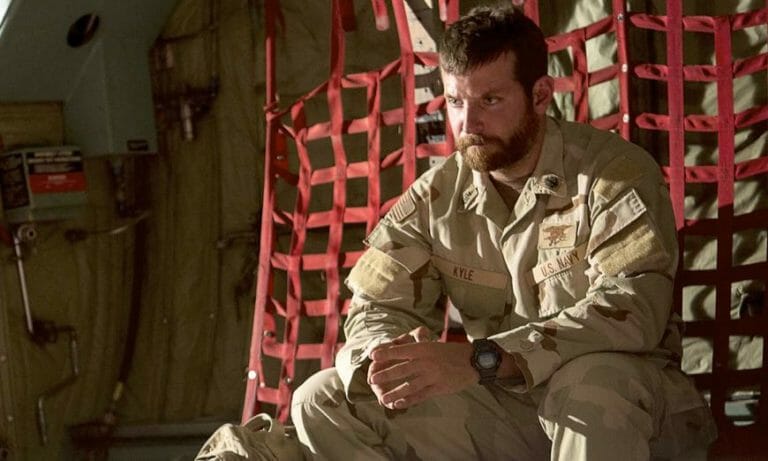By James Powell · February 4, 2015

Since its nationwide release, controversy has swarmed American Sniper, from ex-soldiers, journalists, authors, political figures, critics and just about everyone on Twitter. The thick of the controversy stems from the accused misleading, whitewashed deception of Chris Kyle, the accuracy towards the historical acute nature of the events in the Middle East and the political standpoints the film is or isn’t making about the war. As to which camp I stand in, right in dead center. Conflicted.
American Sniper is Clint Eastwood’s second film in a matter of six months with the release of the not so well received Jersey Boys in June and is the story based on the autobiography, American Sniper: The Autobiography of the Most Lethal Sniper in U.S. Military History written by Chris Kyle, Scott McEwen and Jim DeFelice. The film stars Bradley Cooper as Chris Kyle, a U.S. Navy SEAL sniper and the previously mentioned deadliest Sniper in American history. Sienna Miller stars as Taya (Kyle’s wife) along with Luke Grimes, Kyle Gallner, Sam Jaeger, Jake McDorman and Cody Hardrict.
Be it war films, bio-pics, period pieces or any kind of historical dramatization, the film’s job isn’t to give us a history lesson or an honest portrayal of the events that surround what “it” may be. It’s naive thinking to say the least. However, what it can do is hopefully give us an education, well-constructed, calculated guess as to what it would have been like to taken a part in whatever “it” may be. And as regards to American Sniper, the same applies.
So with regards to American Sniper as a cinematic piece of art, the film from the grit work of Clint Eastwood is a well-intentioned, complex character study of one man’s sad, sober and grim psyche journey to overcome the horrors of being not only a solider both during combat and away, but as an individual trying to find comfort in life much in part to Bradley Cooper’s terrifically subtle and haunting performance.
We start with Kyle right in the thick of things on tour in Fallujah on top of a rooftop escorting a Marine core through the streets. Right there is when the film establishes the tense and often psychological decisions Kyle has to make throughout the film. Effectively with a brilliant smash cut, Eastwood and screenwriter Jason Dean Hall bring us through the straightforward progression of Kyle’s upbringing until he enlists in the military.
Eastwood, at 84 years, still manages to produce a large body of work that alone is impressive, but not as effective in quality. But it is thanks to Eastwood’s grim and cinematic appeal he’s brings, American Sniper is an achievement as a thrilling, pulsating and riveting piece of cinematic modern warfare. His work behind the camera along with DP, Tom Stern, creates a timorous, washed-out and brutal nature to the Middle Eastern setting that feels familiar at times, but is never the less wrong in doing so. Eastwood’s background as a gun slinging Western aficionado stages the action with meticulous details providing point-of-views gun play that never lose sight as to what is going on in each sequence. Eastwood’s hand in the action sequences are worth the price of admission alone.
Despite Eastwood’s effective and suitable nature to American Sniper as a war film, it is where the movie tries to provide more of an insight on Chris Kyle the man, that Eastwood falters in. Jason Dean Hall, whose screenplay landed on the prestige blacklist, wants to emphasize on Kyle’s rooted morals on life and the fixation this title of being the deadliest sniper in American history with clear and concise points that play out throughout the film almost in episodic format.
With Hall’s goals in mind, he pulls strings that play to the psychological torment Kyle faces during his missions and away from them state side. He presents Kyle as someone dedicated to the stricken cause of defeating the enemy at hand and thinks the cause of killing is a rightful passage of sanctuary. However, Eastwood and Hall don’t live quite up to what they are selling, with a missed opportunity of an opposing Sniper that could have painted a parallel man under a similar set of circumstances and a third act of the film where the self-revelation of Kyle is painstakingly rushed into a tidy epilogue that in no way gives us, or Kyle and his family, thematic revelation.
But thanks to Bradley Cooper’s performance, one that required him bulking up and reportedly eating around 8,000 calories a day, presents the mannerisms of a man who lacks a sense of emotional connection with himself and others, as well as having the desire to become sympathetic. Cooper makes Kyle feel almost scary to be around and his implosive behavior he adapts from PTSD is noble, but ambiguous as we are left unsure of Kyle’s real makeup. Sienna Miller really holds her own as the wife of Kyle, Taya, who flourishes as the clichéd solder’s wife. Miller, struggling with confusion, has her worload cut out for her. Moments of sorrow and heartbreak are highly effective as a woman pleading for her husband to come home.
American Sniper is still and will be for some time a film with a cause for concern. As mentioned before, films are not our history books and the naive nature of this thinking will only generate more discussions about what a “history” film can and can’t be. Although American Sniper feels relevant given the precedent set of circumstances going on now and the years before, the film doesn’t feel as though it has the tight grasp on the point of view and perscriptive it wants.
The film is at times an insightful look into the life of the American Sniper that is an effective piece of the implosive struggles the many brave men and women take on themselves. It is, however, problematic with regards to taking a stance on the matters of jingoism.